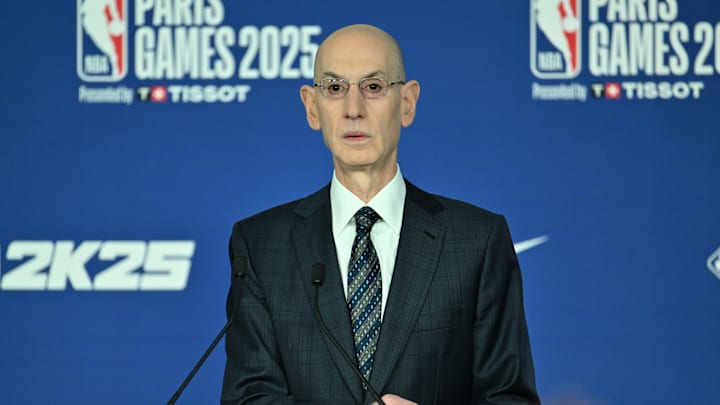Any way you slice it, the Cleveland Cavaliers walloping the Miami Heat was not what the NBA hoped for.
An embarrassing four game sweep where only one game had anything resembling fourth-quarter drama meant television ratings were probably as low as they could possibly be for a playoff series. The league would love every series to go seven games and every game to be competitive; instead, the Cavaliers utted the Heat and left the league wanting.
On Monday night, with the Cavaliers and Heat in the primetime showcase all alone, Cleveland raced out to a massive lead and the game was over by the end of the first quarter; the margin was 39 at halftime and 55 when the final buzzer sounded. At that point, viewers were likely watching hockey or Andor or doing their dishes.
Obviously, part of the equation for the Cavs' targeted evisceration was that this Cleveland team is this good; they had the No. 1 offense in the league and it has been clicking on all cylinders. If they were not up to the task, the outcome would not have been so lopsided.
Yet very good teams, elite teams, teams ostensibly better than this year's Cavaliers team have been in the playoffs before and not won a series like Cleveland just did. Their +122 point differential was the most in NBA history by a massive amount. What went so "wrong" for the league?
To figure that out, we need to go back in time a few years.
Adam Silver brought the Play-In Tournament to the NBA
Adam Silver has been the NBA's Commissioner since 2014, and he has a largely positive opinion among the league, media and fans. He has overseen massive growth in the league's television revenue and some interesting additions such as the NBA Cup and new draft lottery rules to discourage tanking.
One of Silver's "brain children" has been the Play-In Tournament. Based in part on other leagues around the world, the Play-In occurs between the end of the regular season and the start of the playoffs. Instead of the seventh and eighth playoff teams in each conference automatically making it in, they play a short tournament with the ninth and tenth teams to claim those spots.
Again, the reception to this addition has been largely positive. It has produced some good games and big moments during the tournament itself, which is a positive for television partners. The league gave it a test run in the Bubble in 2020, and it has been rolled out in full since 2021.
The Cavaliers are quite familiar with the tournament, as in 2022 they finished as the 8th seed, losing to both the 7th seed and 9th seed to miss the playoffs. Under the old format, they would have been through to the playoffs automatically as the 8th-place finisher.
There is a problem with the Play-In Tournament, however, and it's one that reared its head this season: there is no cut-off for which teams are included.
That is, the 9th and 10th teams are in the Play-In Tournament no matter what. A grossly inferior team that was nowhere close to the playoff field could get a shot to win two games and make the playoffs. In fact, that's exactly what the Miami Heat did.
The Heat went 37-45 this season, 27 games worse than the Cavaliers in first place. It's one thing if a 46-win team is ninth in its conference and gets a chance to battle into the playoff field. It's another entirely when a mechanism is place for a team significantly worse than average gets a second chance on the entire season.
Miami became the first 10th seed to win two consecutive road games and make it into the playoffs, and it was immediately rolled over by the largest margin in NBA history. Against a more qualified opponent, the series is likely tighter, producing a little more of a reason for viewers to actually tune into the games.
If the Play-In Tournament did have a cut-off, a point where you lose too many games to be included in the Play-In Tournament, perhaps it is the Atlanta Hawks in the field instead of the Heat. A Hawks team that beat the Cavs twice in the regular season. Maybe they don't fare much better, but the odds are that the series would be closer. Likely much closer.
Perhaps Adam Silver shrugs his shoulders and moves on. Perhaps he points to some counterfactual to support the current format. Or perhaps he takes a long moment to lean into the embarrassment of this result and consider making a change.
The Cavaliers took on the first 10 seed to ever make the playoffs and unreservedly obliterated them. It can't be what Adam Silver wanted to see. And it is, in a way, his fault.
